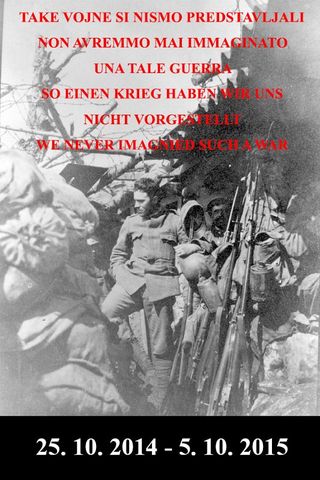We Never Imagened Such a War
25.10.2014 - 05.10.2015The Kobarid Museum and the National Museum of Contemporary History, Ljubljana, have closely collaborated for many years, so the two institutions started the period of commemorating the centennial anniversaries of crucial historical events with two thematic exhibitions under a single title: “We Never Imagined Such a War”. These words by the participant in the Great War, Ivan Matičič, represent the common thread of experiences shared by numerous participants in this war. The course of events exceeded the limits of their ideas about war, and the tongue lacked words to describe it all. It can neither be presented by means of a few bits torn from a mosaic which consists of millions of testimonies by soldiers of various nations.
The exhibition includes mainly their accounts from the time before the final outcome of the war divided them into victors and the defeated. In the subsequent period their words were welcome for the needs of daily politics, but often also unwanted. A latter case, i.e. the dialogue of two French soldiers in the spring of 1917, was chosen for the introduction to his book “Isonzo 1917” by the Italian author Mario Silvestri:
“I defy any patriot to come and pass, as
a private, a mere thousand nights in the first front line,
without getting to hate the fatherland.”
In a similar way, the horrors and the dreadful cost of warfare crushed the onetime advocate of war, the famous author Rudyard Kipling, after it had claimed his son
“If any question why we died,
Tell them, because our fathers lied.”
(Common Form)
Many were affected for their entire lives by humiliation, suffering, starvation and other horrors in the POW camps, rather than by the very events on the front. Left at the mercy of the enemy, they hoped for the end of the war, but, even more absurdly, they continued to be POWs in the subsequent years, when the peace had already been established. With the belief that Kobarid of today has become a place of meeting of and dialogue between the European nations, these bits have not been included in the narrative of the exhibition. Let the sombre narrative be slightly illuminated by a bright ray of Sepp Pailer’s account, written on ‘the day when not a single shot was fired on “his” entire section of the front and the enemies were spared.’
With the only exception of this introductory text, the complete narrative of the exhibition has been entrusted to the words of people who experienced the war themselves. Let us keep their memory alive!

